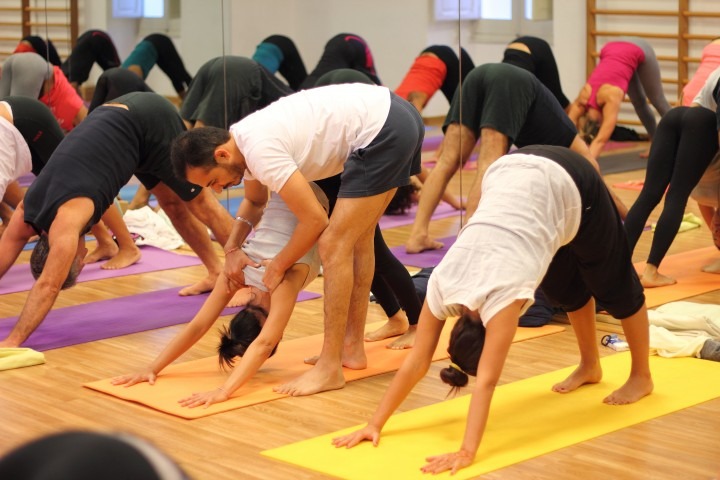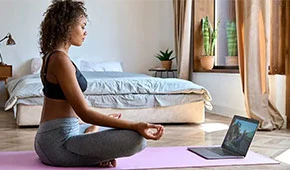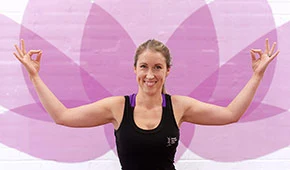
The following article was originally written by Himalaya Yoga Valley staffer Eveanna and published by Yoga Alliance UK Magazine in 2015
The Yoga of Accountability
Many yoga practitioners are turning their passion for yoga into a career and whilst there are plenty of wonderful yoga Teacher Trainings to choose from, it has become more and more apparent that there are also an abundance of poor quality Teacher Trainings around the world.
Trainees are often faced with inexperienced teachers, second-rate methodology and insubstantial curriculums.
Aside from the emotional, physical and spiritual damage being done to these aspiring teachers (and their future students) many trainees also suffer immense financial stress through exorbitant fees, licencing practices and trademarking that traps them in a financial web with their teachers. The outcome of poor quality trainings churning out poor quality teachers is that many people who have tried one yoga class will never set foot in a yoga studio again because they were injured, misled or damaged on a psychological or emotional level by a graduates of these programs.
With so many Teacher Trainings and new yoga teachers out in the world how can the yoga community stay on track and ensure new students are protected from poorly trained teachers and trainees are protected from bad Teacher Trainings? Perhaps by looking back to India, the source of our science for guidance and into a future where we take responsibility as teachers and trainers we can move forward into a space of professional integrity.
Having lived and worked on Yoga Teacher Training Programs at Himalaya Yoga Valley in India for the last 7 years I have witnessed an influx of new trends, styles and paths of yoga from the western perspective brought through our doors by yoga students from all over the world. Whilst I appreciate the open minded and inclusive practice that is yoga today I have also seen some negative changes caused by deviation from traditional practices.
One of these deviations that has had serious ramifications on our very young, western yoga world is the lack of professional and personal reflection in relation to standards and practices. It appears that self-inquiry and a senior teacher to present the findings of these reflections to is rarely a part of a modern day practice. Unfortunately it is often the case that teachers are missing a Guru or elder within their yoga community to look up to, to take advice from, to further their knowledge with and to be accountable to. It also appears that most trainees who attend trainings are not offered a continuing relationship with their mentors.
Through the traditional practice of accountability we can greatly improve the current state of the Yoga Teacher Trainings and yoga in general. By respecting the deep importance of lineage and the importance of self-reflection we can become better practitioners and teachers.
In an indigenous setting, lineage is highly valuable and deeply sacred to the practitioner. It provides students with a history and a future path on which to take their practice. Being initiated into a particular lineage is a great privilege and responsibility. To tarnish the reputation of your Guru, to sully the teachings that have been pure for thousands of years with your own ego or bad behaviours would be a betrayal of your yogic ancestry. For most Indigenous yoga practitioners severing or damaging your lineage would mean becoming spiritually lost.
Lineage in this capacity may seem restrictive for the student but the traditional practice of teaching your students to be entirely nondependent on you balances out this potential issue. All of the great and true Gurus in India strive to create masters within their students. The practice of non-attachment with between student and Guru ensures freedom from being bound by your teacher. The beauty of this philosophy is we will always need our teachers and always turn to our lineage without being confined and most importantly we will always have someone to be accountable to with each step we take on our spiritual path.
The role of the Guru is invaluable for the student. An accomplished teacher is one who remains an eternal student. Without spiritual self-inquiry and leadership from those who have greater experience than us we can begin to feel like the source of knowledge rather than a conduit for this knowledge. When this happens we see the seeds of grandiose teachings, competitiveness, greed and unhappiness cultivate in our teachings and life. We also see poor quality teachings resulting from this lack of guidance and professional counsel.
But what about the thousands of students and teachers who do not have a Guru on hand to be accountable to? Who can we look to maintain standards, ensure the practice of yoga stays free from damage?
If each yoga practitioner takes responsibility for their own spiritual growth, professional development and yoga practice on a holistic level we should be able to self-regulate through the great science of yoga as many practitioners have done for thousands of years.
Trainers should be encouraging trainees to practice looking in the mirror daily as part of their discipline. Yoga practitioners should constantly question their own integrity. Are we really practicing yoga if we spend two hours on our yoga mat making shapes every day but do not study ourselves in relation to the Yamas and Niyamas? Are we really practicing yoga if we go to workshops and professional development courses but we treat our fellow teachers badly because of envy? Are we really practicing yoga if we feel so passionately entitled to charge for our services but feel no responsibility to give back through seva? Are we truly teachers if we cease being open to learn and thus stop giving to our students?
It is entirely up to each individual that makes up our yoga community as a whole to practice the most important path a yogi with ever step upon- the path of self-inquiry. We have the tools in the 8 limbs it is our responsibility to pick them up and use them to become better teachers, mentors and individuals.
Trainers and facilitators of Teacher Training Programs can greatly improve their own curriculums, businesses and most importantly; the outcomes of these courses and the quality of the teachers they send out into the world, by reflecting on their programs and practices and by being accountable to their Gurus before them and to Yoga Alliance. As trainers we must be the first ones to put our hands up to be evaluated and reviewed if we expect our students to follow suit. Professional transparency and accountability can bring more standing and genuine integrity to schools that wish to establish themselves as credible trainers within the yoga community.
Fresh graduates of a 200 hour program are fledglings in the world of yoga; they need guidance & direction and they also need to be held accountable. I believe that as teacher trainers the more we insist Yoga Alliance acts as guide to these teachers the more integrity we will see back in our classrooms. As teacher trainers sending these new teachers out in the world it is not ethical to do so without giving them an anchor to attach to professionally. Developing a relationship with Yoga Alliance and being available as trainers, not just for 200 hours but for a lifetime is this anchor. We should also reflect the standards that teachers should see when they look in the mirror of self-inquiry that we have held up to them.
The act of becoming accountable to ourselves and Yoga Alliance will emulate the role the Guru plays in a traditional sense, questioning all aspects of who we are on every level to bring positive growth. As yogis it is time to take individual and organizational responsibility by creating positive gatekeepers of yoga standard to stay healthy, honest and grounded as a community.
When we first stepped onto a yoga mat we consciously or subconsciously began a journey of self-determination and personal responsibility- we became accountable to ourselves through our practice, as a collective if we wish to see an improvement in standards we will need to carry over these qualities we first connected with to our professional standards.
Written by Eveanna de Barra for Yoga Alliance UK teachers magazine.





